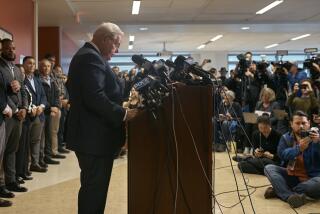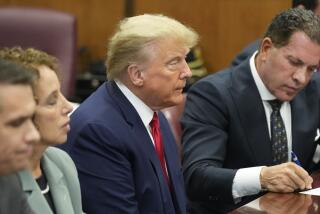Democrats Urge Clinton to End Lewinsky Drama
- Share via
WASHINGTON — As the clock ticks toward President Clinton’s historic testimony before a federal grand jury Monday, a growing number of Democratic strategists and officeholders are calling on him to make a dramatic gesture to defuse the controversy--even if that means publicly acknowledging mistakes in his relationship with Monica S. Lewinsky.
Their restiveness reflects concern that the unfolding legal drama could blot out any other Democratic message and thus endanger the party’s prospects in the November elections.
“Every Democrat wants this behind us so we can talk about issues in the fall,” said one senior Democratic lawmaker. “We want the president to explain what happened. . . . We want [independent counsel Kenneth W.] Starr to pull the plug. We want this over.”
Starr is trying to determine whether Clinton had a sexual relationship with Lewinsky, a former White House intern, and then asked her to lie about it. Clinton will testify via closed-circuit television.
Added Democratic pollster Geoff Garin: “I assume that he will testify truthfully. . . . And if his past public statements are badly out of whack with his testimony, he will have to publicly own up to that.”
This call for Clinton to deliver some form of a mea culpa rests on two assumptions now widespread in Democratic circles.
One is a belief that, if necessary, Clinton can ride out an admission that he engaged in an inappropriate relationship with Lewinsky. The other is fear that if Clinton holds to his denials after Lewinsky’s reported testimony that she and the president had an affair, the controversy would surge to a new peak of intensity--dispiriting Democrats and giving conservatives added incentive to vote.
One party strategist said the Democrats were in danger of passing up a chance to hammer the Republicans who control Congress. “We have an opportunity to expose them for how little they’ve done.”
Clinton’s decisions on what to tell the grand jury could reverberate all the way through campaign 2000 because the approval rating of the outgoing president has historically cast a long shadow over the race to succeed him. If the controversy ultimately undermines Clinton’s support, Vice President Al Gore could be buried in the rubble, too.
This year, at a time when Americans have been emphatically disengaged from Washington, both parties consider the controversy an electoral wild card. Though convinced that the allegations against the president will hurt Democrats, many Republicans worry that they could also provoke a voter backlash if they seem too eager to begin impeachment hearings after receiving a report from Starr.
For Democratic candidates, the controversy creates more immediate complications. The problem starts with a lack of information: Perhaps no one other than the president and Lewinsky can say for sure what really happened.
Most Democrats assume there is more to the story than Clinton has let on. The agitation for a public statement reflects roughly equal parts confidence and anxiety about what that possibility could mean for the fall elections.
Though it is impossible to predict how Americans might react to any sort of confession from Clinton, most Democrats are relatively confident that the public would not stampede against him. That is because Clinton’s job approval ratings have not declined even as the percentage of people who believe that he had an affair with Lewinsky has increased.
In just the last few weeks--as Lewinsky has come forward with her story--the percentage of Americans who believe Clinton’s denials has dropped to about 25% in most surveys. But his approval rating has remained above 60% and even increased slightly, depending on the poll.
“What people are saying is these charges, while they are personally deplorable, are not sufficient if they are true to warrant removal of Bill Clinton from office,” said Andrew Kohut, director of the Pew Research Center, which has conducted extensive polls on the controversy.
On the other hand, Democrats express at least three separate fears about what might happen if Clinton continues to deny an intimate relationship with Lewinsky and information--especially physical evidence--later contradicts him:
* Most basically, if Americans conclude that Clinton lied in his testimony to a federal grand jury, they may be far less forgiving than they have been about the possibility that he testified falsely when he denied under oath that he had a sexual relationship with Lewinsky in the Paula Corbin Jones sexual harassment case.
Only a minority of voters have told pollsters that Congress should begin impeachment hearings if it is proved that Clinton lied in the Jones case, which has since been dismissed. But one Democratic consultant close to the congressional leadership said that if Clinton is judged to have lied to the grand jury, “I fear that you are going to see Democrats start to use the ‘I’ word”--impeachment.
* Second, many Democrats worry that Clinton’s approval ratings could finally start to decline--dragging the party down with him--if voters conclude that the controversy is consuming the White House and diminishing his effectiveness.
That risk increases the longer the story makes headlines--especially as the gyrations in the stock market introduce the first faint tremors of economic uncertainty into the political environment. “If people see some consequences related to Clinton’s ability to govern, that ultimately will be reflected in his job approval rating,” Garin said.
* Finally, Democrats fear that the media focus on the controversy will prevent any other issues from emerging this fall. That potentially is a substantial risk because several GOP polls this summer have suggested that rank-and-file Democrats now appear less inclined to vote in November than hard-core social conservatives, who seem eager to register their displeasure with the president.
Though they dispute those assessments, Democrats acknowledge that the longer the Lewinsky cloud dominates the news, the more difficult it will be for them to engage the GOP on issues--such as taxes, Social Security and health care--that could help get core Democratic supporters to the polls.
Any admission of wrongdoing from Clinton--no matter how vaguely worded--would expose both him and Democrats who have defended him to painful questioning about his earlier denials. A senior House Democratic aide said that most Democrats believe the public is so eager to move past the controversy that Clinton and the party “can survive if he brings closure to the story.”
Still, that hardly is a sure thing. Many in the party believe that, even if Clinton offered a general concession, his critics would only demand more specific admissions. Any confession could also provide ammunition for Starr if he decides to try to indict Clinton--an option he apparently has not foreclosed.
And an admission by Clinton that he lied in January when he emphatically denied a sexual relationship with Lewinsky--in footage that would be replayed endlessly if he recanted--could focus doubts about his trustworthiness and cripple his ability to persuade the public on any subject. If Clinton’s credibility were to collapse, that would be a boost for candidates promising change in 2000--and a heavy cross for Gore to bear.
Get more analysis from Ronald Brownstein and join a continuing discussion of the Monica S. Lewinsky matter on The Times’ Web site. Go to: https://www.latimes.com/scandal
More to Read
Get the L.A. Times Politics newsletter
Deeply reported insights into legislation, politics and policy from Sacramento, Washington and beyond. In your inbox twice per week.
You may occasionally receive promotional content from the Los Angeles Times.










